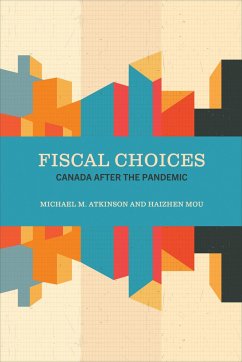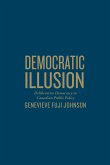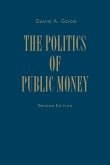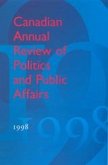- Gebundenes Buch
- Merkliste
- Auf die Merkliste
- Bewerten Bewerten
- Teilen
- Produkt teilen
- Produkterinnerung
- Produkterinnerung
Drawing on interviews with economic policymakers, Fiscal Choices examines the fiscal policies implemented by the Canadian government in response to the COVID-19 pandemic, and the economic and political challenges that we face in the aftermath.
Andere Kunden interessierten sich auch für
![Toronto the Good? Toronto the Good?]() Shana AlmeidaToronto the Good?76,99 €
Shana AlmeidaToronto the Good?76,99 €![Democratic Illusion Democratic Illusion]() Genevieve Fuji-JohnsonDemocratic Illusion73,99 €
Genevieve Fuji-JohnsonDemocratic Illusion73,99 €![Sleeping Dogs Sleeping Dogs]() Andrew McDougallSleeping Dogs86,99 €
Andrew McDougallSleeping Dogs86,99 €![Politics of Public Money, Second Edition Politics of Public Money, Second Edition]() David A GoodPolitics of Public Money, Second Edition101,99 €
David A GoodPolitics of Public Money, Second Edition101,99 €![Canadian Annual Review of Politics and Public Affairs Canadian Annual Review of Politics and Public Affairs]() Canadian Annual Review of Politics and Public Affairs152,99 €
Canadian Annual Review of Politics and Public Affairs152,99 €![Off and Running Off and Running]() David ZussmanOff and Running66,99 €
David ZussmanOff and Running66,99 €![Canadian Annual Review of Politics and Public Affairs Canadian Annual Review of Politics and Public Affairs]() Canadian Annual Review of Politics and Public Affairs156,99 €
Canadian Annual Review of Politics and Public Affairs156,99 €-
-
-
Drawing on interviews with economic policymakers, Fiscal Choices examines the fiscal policies implemented by the Canadian government in response to the COVID-19 pandemic, and the economic and political challenges that we face in the aftermath.
Produktdetails
- Produktdetails
- Verlag: University of Toronto Press
- Seitenzahl: 288
- Erscheinungstermin: 8. April 2024
- Englisch
- Abmessung: 229mm x 152mm x 21mm
- Gewicht: 599g
- ISBN-13: 9781487545789
- ISBN-10: 1487545789
- Artikelnr.: 69234879
- Herstellerkennzeichnung
- Libri GmbH
- Europaallee 1
- 36244 Bad Hersfeld
- gpsr@libri.de
- Verlag: University of Toronto Press
- Seitenzahl: 288
- Erscheinungstermin: 8. April 2024
- Englisch
- Abmessung: 229mm x 152mm x 21mm
- Gewicht: 599g
- ISBN-13: 9781487545789
- ISBN-10: 1487545789
- Artikelnr.: 69234879
- Herstellerkennzeichnung
- Libri GmbH
- Europaallee 1
- 36244 Bad Hersfeld
- gpsr@libri.de
By Michael M. Atkinson and Haizhen Mou
List of Illustrations
List of Tables
Preface
Abbreviations
1. The Pandemic and After
Responding to the Pandemic
The Post-pandemic Search for Stability
What Kind of Change Is Required?
Keep in Mind
2. Making Economic Decisions
An Epistemic Elite
Distinctive Roles and Critical Relationships
The Limitations of Elite Decision-Making
Conclusion
3. Governing after the Pandemic
Can Government Do Good?
Stabilizing the Economy: Program Design and Delivery
Governments’ Role in the Economy: Will Anything Change?
The Growth Imperative
Conclusion
4. Coping with Income and Wealth Inequalities
Why Is Inequality a Problem?
The Complicated Relationship between Inequality and Economic Growth
Traditional Programs That Tackle Inequality
Alternative Proposals on Inequality
Conclusion
5. Dealing with the Debt
Debt Dimensions
The Debt Threat
Guardrails, Anchors, and Rules
Debt Options: Good, Bad, and Ugly
Conclusion
6. Holding the Federation Together
Evaluating Fiscal Federalism Institutions
The Pandemic: Addressing a Fiscal Emergency
Risk Reduction
Risk Sharing
Conclusion
7. Keeping Government Accountable
On Being Accountable
Parliament and the Budget Process
Bureaucrats, Budgets, and Program Reviews
Auditors and Budget Officers
Conclusion
8. Canada’s Fiscal Future
Stubborn Realities
Pandemic Effects
Pressing Needs
Conclusion
Appendix 1: Interview Questions
Appendix 2: A Survey on Canadians’ Opinions on the Post-pandemic Economy
and Fiscal Policy
References
Index
List of Tables
Preface
Abbreviations
1. The Pandemic and After
Responding to the Pandemic
The Post-pandemic Search for Stability
What Kind of Change Is Required?
Keep in Mind
2. Making Economic Decisions
An Epistemic Elite
Distinctive Roles and Critical Relationships
The Limitations of Elite Decision-Making
Conclusion
3. Governing after the Pandemic
Can Government Do Good?
Stabilizing the Economy: Program Design and Delivery
Governments’ Role in the Economy: Will Anything Change?
The Growth Imperative
Conclusion
4. Coping with Income and Wealth Inequalities
Why Is Inequality a Problem?
The Complicated Relationship between Inequality and Economic Growth
Traditional Programs That Tackle Inequality
Alternative Proposals on Inequality
Conclusion
5. Dealing with the Debt
Debt Dimensions
The Debt Threat
Guardrails, Anchors, and Rules
Debt Options: Good, Bad, and Ugly
Conclusion
6. Holding the Federation Together
Evaluating Fiscal Federalism Institutions
The Pandemic: Addressing a Fiscal Emergency
Risk Reduction
Risk Sharing
Conclusion
7. Keeping Government Accountable
On Being Accountable
Parliament and the Budget Process
Bureaucrats, Budgets, and Program Reviews
Auditors and Budget Officers
Conclusion
8. Canada’s Fiscal Future
Stubborn Realities
Pandemic Effects
Pressing Needs
Conclusion
Appendix 1: Interview Questions
Appendix 2: A Survey on Canadians’ Opinions on the Post-pandemic Economy
and Fiscal Policy
References
Index
List of Illustrations
List of Tables
Preface
Abbreviations
1. The Pandemic and After
Responding to the Pandemic
The Post-pandemic Search for Stability
What Kind of Change Is Required?
Keep in Mind
2. Making Economic Decisions
An Epistemic Elite
Distinctive Roles and Critical Relationships
The Limitations of Elite Decision-Making
Conclusion
3. Governing after the Pandemic
Can Government Do Good?
Stabilizing the Economy: Program Design and Delivery
Governments’ Role in the Economy: Will Anything Change?
The Growth Imperative
Conclusion
4. Coping with Income and Wealth Inequalities
Why Is Inequality a Problem?
The Complicated Relationship between Inequality and Economic Growth
Traditional Programs That Tackle Inequality
Alternative Proposals on Inequality
Conclusion
5. Dealing with the Debt
Debt Dimensions
The Debt Threat
Guardrails, Anchors, and Rules
Debt Options: Good, Bad, and Ugly
Conclusion
6. Holding the Federation Together
Evaluating Fiscal Federalism Institutions
The Pandemic: Addressing a Fiscal Emergency
Risk Reduction
Risk Sharing
Conclusion
7. Keeping Government Accountable
On Being Accountable
Parliament and the Budget Process
Bureaucrats, Budgets, and Program Reviews
Auditors and Budget Officers
Conclusion
8. Canada’s Fiscal Future
Stubborn Realities
Pandemic Effects
Pressing Needs
Conclusion
Appendix 1: Interview Questions
Appendix 2: A Survey on Canadians’ Opinions on the Post-pandemic Economy
and Fiscal Policy
References
Index
List of Tables
Preface
Abbreviations
1. The Pandemic and After
Responding to the Pandemic
The Post-pandemic Search for Stability
What Kind of Change Is Required?
Keep in Mind
2. Making Economic Decisions
An Epistemic Elite
Distinctive Roles and Critical Relationships
The Limitations of Elite Decision-Making
Conclusion
3. Governing after the Pandemic
Can Government Do Good?
Stabilizing the Economy: Program Design and Delivery
Governments’ Role in the Economy: Will Anything Change?
The Growth Imperative
Conclusion
4. Coping with Income and Wealth Inequalities
Why Is Inequality a Problem?
The Complicated Relationship between Inequality and Economic Growth
Traditional Programs That Tackle Inequality
Alternative Proposals on Inequality
Conclusion
5. Dealing with the Debt
Debt Dimensions
The Debt Threat
Guardrails, Anchors, and Rules
Debt Options: Good, Bad, and Ugly
Conclusion
6. Holding the Federation Together
Evaluating Fiscal Federalism Institutions
The Pandemic: Addressing a Fiscal Emergency
Risk Reduction
Risk Sharing
Conclusion
7. Keeping Government Accountable
On Being Accountable
Parliament and the Budget Process
Bureaucrats, Budgets, and Program Reviews
Auditors and Budget Officers
Conclusion
8. Canada’s Fiscal Future
Stubborn Realities
Pandemic Effects
Pressing Needs
Conclusion
Appendix 1: Interview Questions
Appendix 2: A Survey on Canadians’ Opinions on the Post-pandemic Economy
and Fiscal Policy
References
Index








